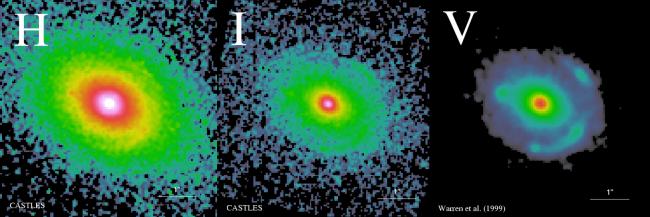CASTLES Survey
Large galaxies and galaxy clusters sometimes act like lenses. Their gravity distorts the structure of spacetime, magnifying light from more distant objects. This effect, known as strong gravitational lensing, allows astronomers to study galaxies that would ordinarily be too far to see, map the distribution of mass in the galaxies doing the lensing, and measure the expansion rate of the universe. The CASTLeS (CfA-Arizona Space Telescope Lens Survey) is a program jointly managed by the Center for Astrophysics | Harvard & Smithsonian and the University of Arizona, which used NASA’s Hubble Space Telescope to study multiple aspects of strong gravitational lensing as caused by galaxies. Today, CASTLeS team members maintain a catalog of these lenses, updated with new observational data.

A Gravitational Catalog
As predicted by Einstein’s theory of general relativity, massive bodies change the geometry of spacetime, which affects the paths of passing objects — including light. For very massive astronomical objects like large galaxies, the effect can be strong enough to create magnified, distorted, or even multiple images of more distant galaxies. This strong gravitational lensing effect is a powerful way to study both the lens galaxies and whatever they magnify.
However, not every galaxy is a strong gravitational lens. The CASTLeS project began in the late 1990s as a way to catalog every known galactic gravitational lens and discover additional lenses. The project team used the Hubble Space Telescope to obtain high-resolution visible-light and infrared images of more than 20 lens galaxies. They used this data to obtain the galaxy masses and probed the internal structure of the lens galaxies to characterize how much interstellar gas and dark matter they contain.
Since the end of the observational portion of CASTLeS, astronomers have identified many more strong lensing systems; as of 2019 the catalog contains 100 galaxies. The data is used to track the expansion rate of the universe and probe galactic structure. The CASTLeS team consists of Emilio Falco and Brian McLeod at CfA, Chris Impey of the University of Arizona, Christopher Kochanek of the Ohio State University, and Hans-Walter Rix of the Max Planck Institute for Astronomy in Germany.